Key takeaways:
- Understanding licensing basics, such as mechanical and synchronization rights, is crucial for artists and labels to ensure fair compensation and protect their work.
- Networking with industry professionals and engaging in online communities enhances knowledge of licensing trends and fosters valuable collaborations.
- Staying informed through industry news, webinars, and personal experiences aids in navigating the complexities of music licensing and encourages creative approaches.
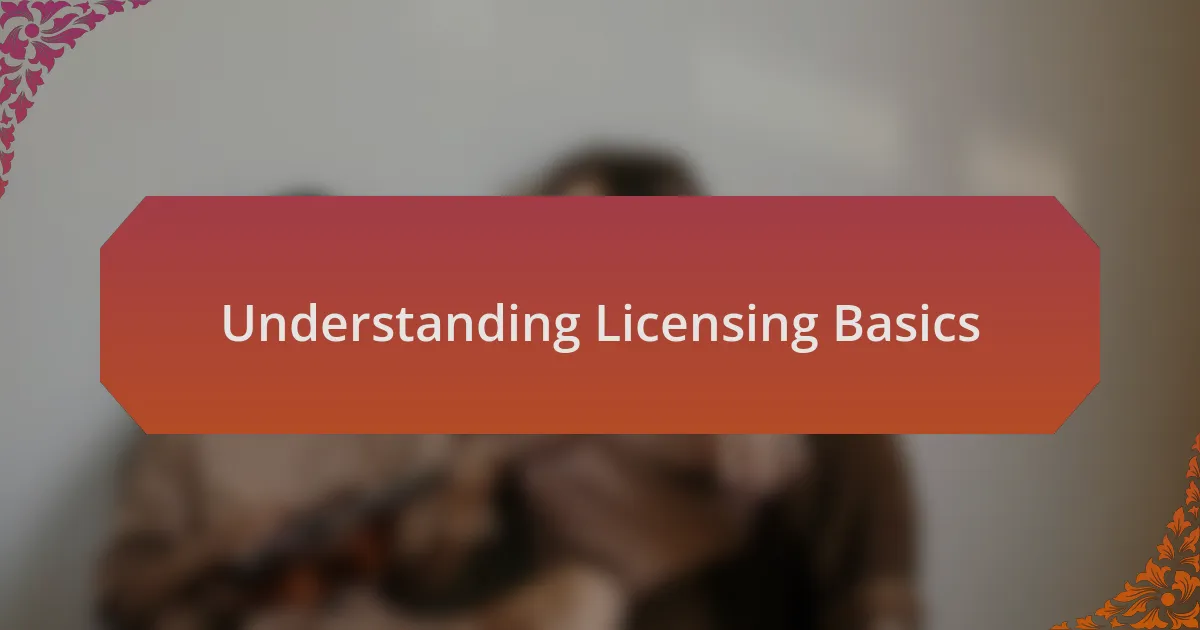
Understanding Licensing Basics
Understanding the basics of licensing can feel overwhelming, especially for those of us passionate about music but unfamiliar with the legalities. I remember my early days in the industry, grappling with terms like “mechanical royalties” and “synchronization rights.” Have you ever paused to think about how crucial these licenses are in getting a song on a streaming platform or in a film?
Diving deeper into mechanical licensing, I learned that it’s essential for reproducing music, whether it’s on CDs or digital downloads. The first time I navigated that process for my label, I felt a surge of accomplishment when I secured the rights. It wasn’t just paperwork; it was a step towards ensuring the artists I represent receive the compensation they deserve. Isn’t it satisfying to know that every stream or download contributes to an artist’s livelihood?
Synchronization licenses struck a chord with me during my journey, primarily when I placed a track in a short film. The thrill of hearing that song matched with visuals was unforgettable. It’s here that I realized the power of licensing—not only as a legal requirement but as a bridge connecting art to various media. What do you think is the most exciting aspect of licensing in today’s music landscape?

Importance of Licensing in Music
Licensing in music serves as the backbone of the industry, protecting both the rights of artists and the integrity of their work. Reflecting on my own experiences, I can attest that obtaining licensing is not merely a formality; it’s about establishing trust with artists. Without proper licensing, an artist’s hard-earned creations could be used without acknowledgment or compensation – a thought that keeps me vigilant in this business.
Navigating the complexities of copyright law can feel daunting, but I’ve grown to appreciate its importance. Once, I was fortunate enough to help a local band secure a performance license for a festival. Seeing their excitement when they realized their music would reach a larger audience reminded me of why licensing matters—it legitimizes the value of their art. Have you ever considered how each song played in public spaces benefits not just the venue, but the creators behind the music as well?
Moreover, licensing isn’t just about protecting rights; it’s also a way to foster collaboration. I vividly recall a time when two artists I managed teamed up on a project, and we had to navigate the licensing agreements for their joint work. The discussions were intense, but what emerged was a beautiful collaboration that blended their styles seamlessly. It opened my eyes to how licensing enables creativity while ensuring that everyone involved is recognized and compensated for their contributions. Isn’t it fascinating how these legal frameworks can enhance artistic expression?
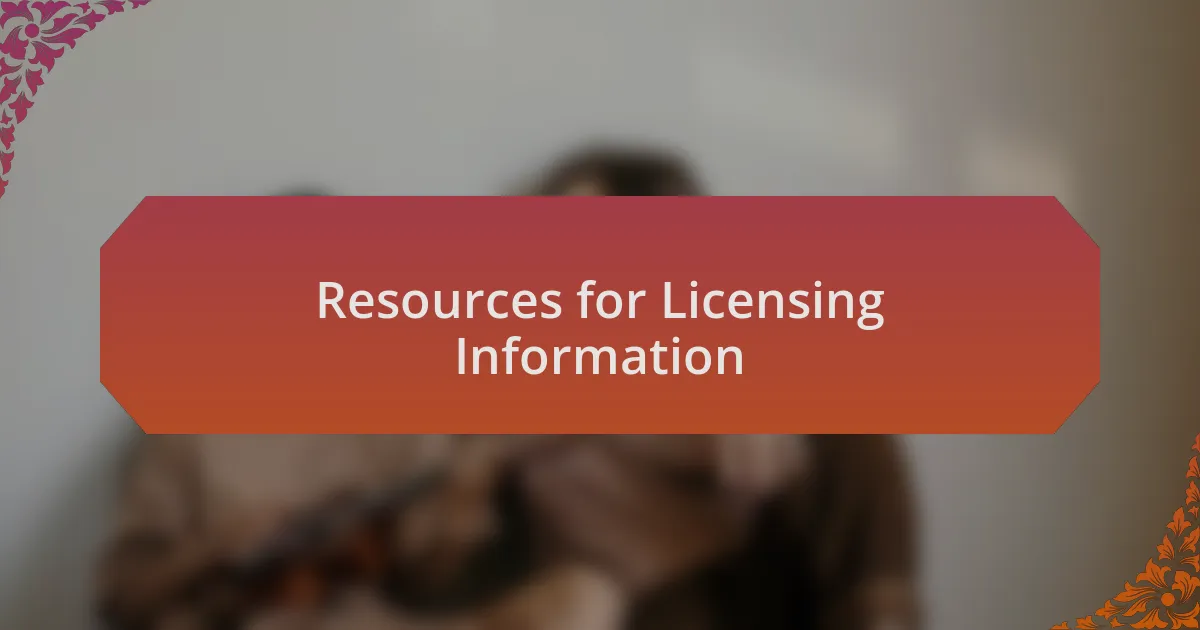
Resources for Licensing Information
When it comes to resources for licensing information, I often turn to specialized websites that cater specifically to the music industry. Organizations like the American Society of Composers, Authors and Publishers (ASCAP) and Broadcast Music, Inc. (BMI) are invaluable. They not only provide up-to-date licensing guidelines but also offer educational materials to help independent labels navigate the often-confusing world of music rights.
Another essential resource is the United States Copyright Office. I find that their detailed guidelines and FAQs can clarify many questions about copyright registration and licensing terms. Whenever I’ve had doubts about licensing protections, their online resources have offered a solid foundation that reassures me. Have you ever found yourself scrolling through legal jargon and just wishing for a simpler explanation? I’ve been there too, and I can assure you that this resource simplifies what can be a complex maze.
Lastly, networking with fellow label owners has proven to be an excellent way to stay informed about licensing trends. I often chat with peers at industry events or online forums, sharing experiences and tips. For instance, a conversation I had recently revealed some lesser-known licenses that can actually enhance your catalog’s reach. It’s incredible how much you can learn when you connect with others who are just as passionate about the music business. What about you? Have you tried reaching out to your network for insights?
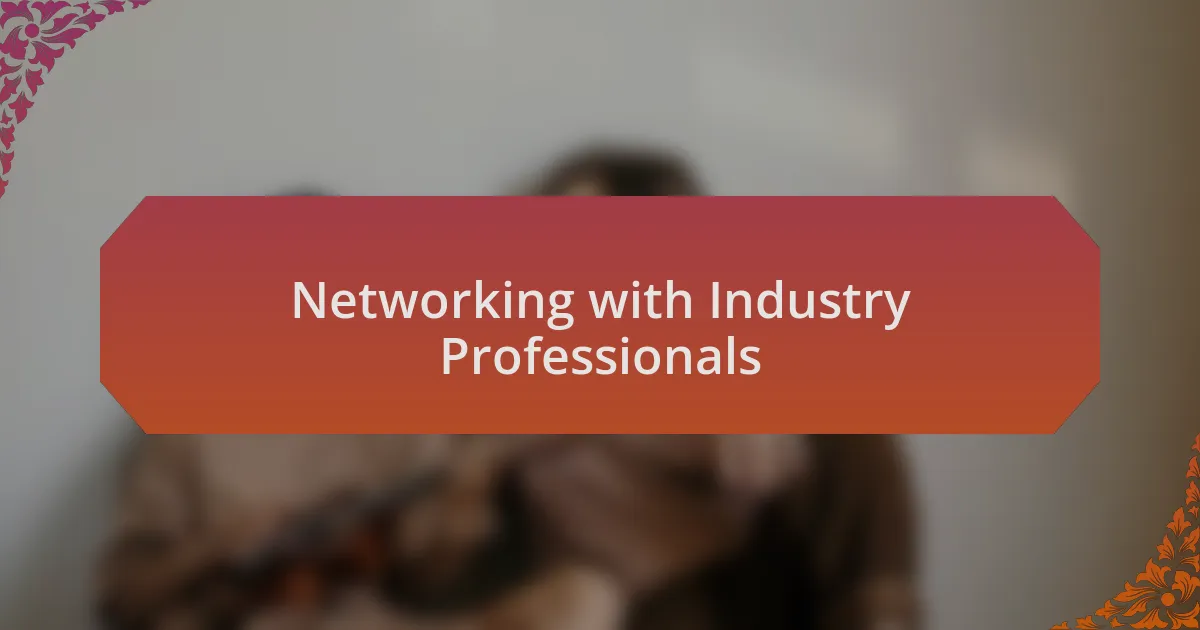
Networking with Industry Professionals
Building relationships with industry professionals has always been a priority for me. I remember attending a local festival where I struck up a conversation with a veteran producer. This casual chat turned into a mentorship opportunity that introduced me to new licensing practices I hadn’t encountered before. Have you ever thought about how a simple conversation can lead to impactful learning?
By actively participating in music industry events, I’ve met some truly inspiring people. There’s a unique camaraderie when you find yourself surrounded by others who understand the pressing challenges of licensing. It’s reassuring to discuss hurdles, swap stories, and even laugh about the absurdities we encounter in navigating licensing laws. Don’t you find that sharing experiences often leads to unexpected solutions?
Furthermore, I make it a point to follow up with the contacts I meet. I’ve sent emails and set up calls with individuals I’ve connected with; these discussions keep me in the loop about evolving licensing landscapes. Just last week, a colleague shared insights on recent changes in licensing regulations that could significantly affect our labeling processes. Wouldn’t it be beneficial if all of us took a moment to nurture these professional relationships?
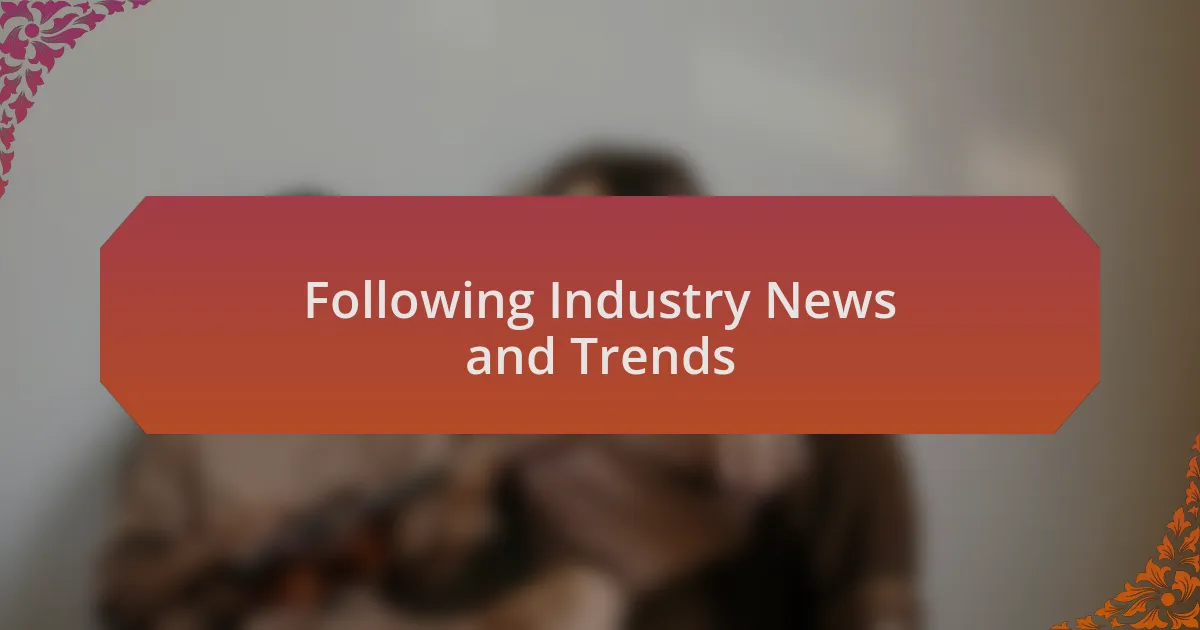
Following Industry News and Trends
Following Industry News and Trends
Staying informed about industry news and trends is crucial in the ever-evolving world of music licensing. I make it a habit to check reputable music industry websites and subscribe to newsletters. Just last month, I came across an article discussing the rise of digital streaming platforms and how they are reshaping licensing agreements. It was eye-opening to see how quickly the landscape changes—have you noticed how many artists are now focusing on online releases?
Social media also plays a significant role in my research. I follow key industry players on platforms like Twitter and LinkedIn, where they share insights and breaking news. I remember reading a post from a well-respected attorney who explained new copyright regulations affecting independent labels. Instances like these give me a clearer picture of the practical implications of these changes—don’t you find that firsthand knowledge can be a game-changer?
Moreover, I find attending webinars and virtual panels incredibly beneficial. Participating in discussions led by experts allows me to ask questions directly related to my concerns. Just recently, I joined a panel where an industry leader discussed emerging trends in licensing agreements. Their perspective challenged my previous assumptions and opened my eyes to new strategies—aren’t those moments of revelation what we seek in our professional journeys?
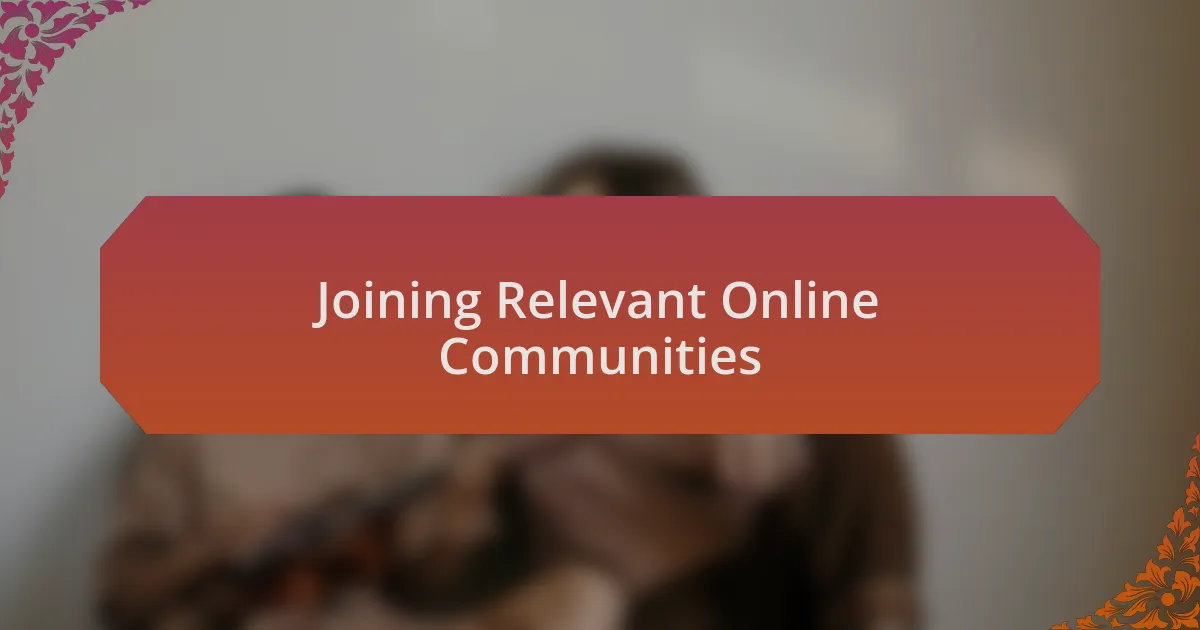
Joining Relevant Online Communities
Engaging with online communities has been a game-changer for me in navigating the complex world of licensing. I remember when I first joined a Facebook group dedicated to independent artists and labels—the camaraderie and shared experiences were instantly uplifting. It was there that I learned about a recent licensing dispute an artist faced and how they resolved it. Have you ever encountered a situation where collective knowledge made all the difference?
These communities not only provide valuable insights but also foster connections with industry peers who understand the challenges we face. Participating in discussions in forums like Reddit or specialized music industry chat rooms has allowed me to exchange ideas, share strategies, and even collaborate on projects. One time, I connected with another label owner who had successfully navigated a tricky licensing issue. Their advice was invaluable—it felt like having a mentor right at my fingertips.
Moreover, I appreciate that these platforms often highlight various resources, from legal advice to market trends. Just last week, I came across a thread discussing a new licensing software that several members recommended. Taking the plunge and trying out that tool has streamlined my workflow significantly. Isn’t it remarkable how a simple online interaction can lead to practical, actionable outcomes?
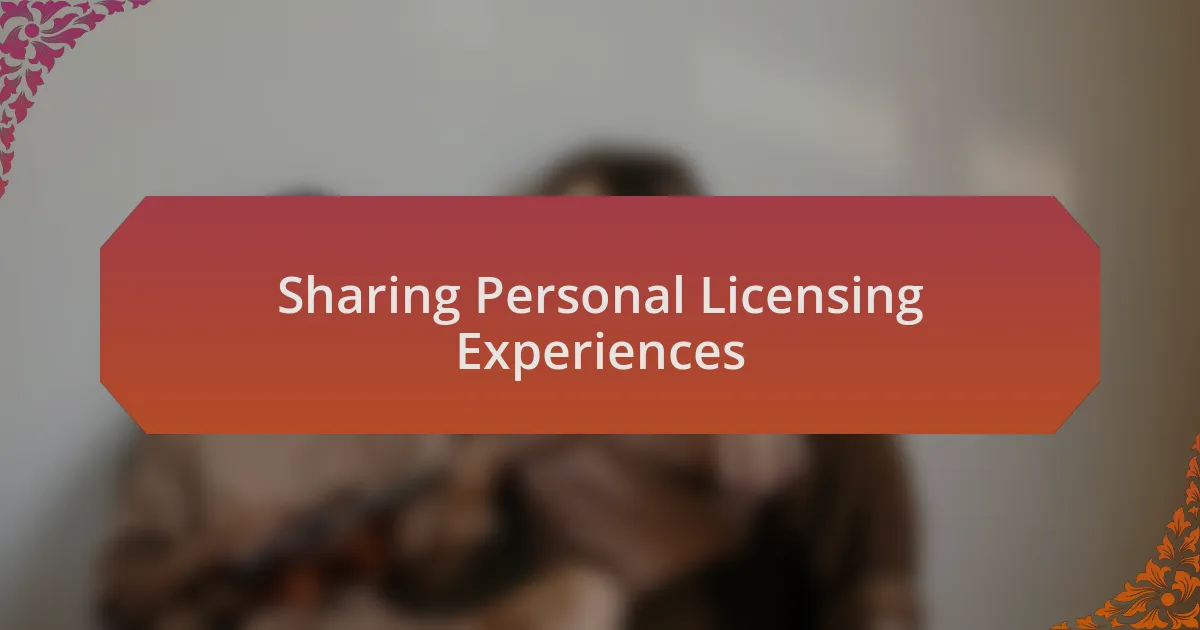
Sharing Personal Licensing Experiences
Sharing my personal licensing experiences has been eye-opening. A few months ago, I found myself in a rather tense situation when a track I was managing was flagged for potential copyright infringement. Through a member of one of those online communities, I learned the right steps to clarify the ownership of the sample used, which ultimately saved us from a lengthy legal battle. Have you ever felt that rush of relief when you stumble upon the solution just when you needed it?
There was another instance where I participated in a virtual panel discussion with other independent label owners about the challenges of sync licensing. One participant shared her triumph about landing a placement in a popular TV show, and her strategy helped me rethink my own approach to pitching music. Hearing her journey inspired me to take more risks and step out of my comfort zone. Isn’t it incredible how other people’s stories can ignite a spark in us?
These exchanges often remind me that we’re not alone in this licensing maze. I recall an emotional moment during a live Q&A when an artist shared their struggle with not being able to clear a sample and how it impacted their career. Their vulnerability made me realize the weight we all carry and reinforced the importance of sharing our journeys. Each experience adds a layer of richness to the collective understanding, making us all more resilient in the face of challenges.